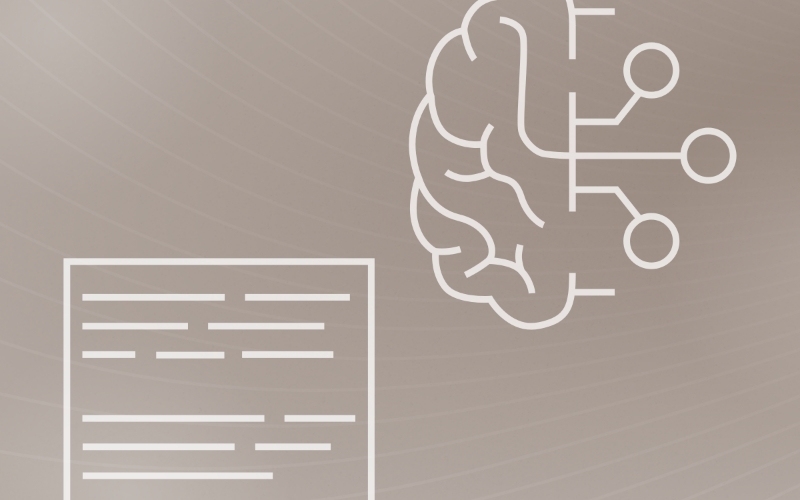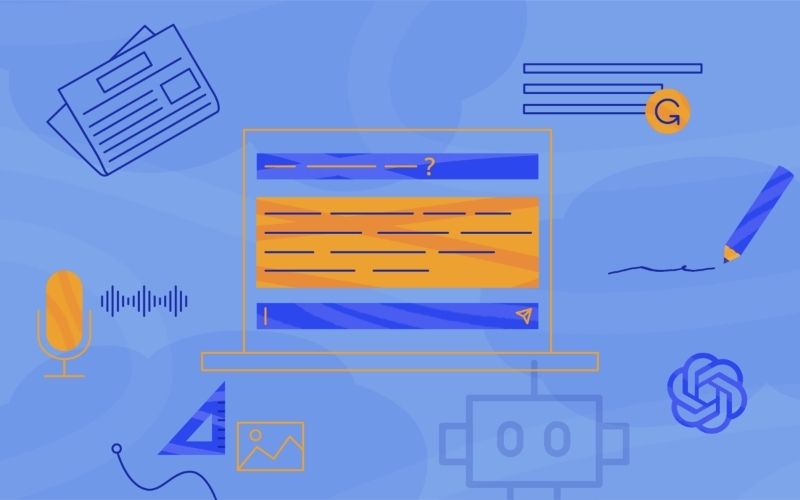Content Marketing
Industry Trends
Search

Written By
Wray Ward
The rapid advancement of AI is having a major impact on all aspects of digital marketing, including search engine optimization and digital content strategy. With dizzying AI capabilities such as large language models, machine learning and natural language processing, it can be hard to keep up: Present-day marketers must navigate the seemingly hundreds of AI tools emerging every day while also considering their customers’ needs, creating content, optimizing their website and more.
To compete and succeed in this landscape, marketers must recognize both the benefits and the challenges of AI technology. From an SEO perspective, sustained success will take a thoughtful combination of content written by humans and AI-generated content, playing to the strengths of each.
In this blog post, I’ll outline some of the ways AI can improve your website’s SEO strategy — and pitfalls to avoid.
How can AI help your SEO strategy?
1. Quickly summarizing keyword research data has become easier with AI.
I’ve spent several months testing Anthropic’s AI assistant tool, Claude. Claude is far from the only chatbot tool, but I like Claude for its ability to efficiently summarize lengthy documents (usually PDFs) into bullets or more conversational formats.
To see how it would approach summarizing a long, exported PDF full of keyword research data from a recent project, I asked Claude to review the keywords and give me 10 key takeaways in the form of bullet points.
The results surprised me: Based on the primary keyword clusters and hundreds of supporting long-tail keywords in the document, Claude was quickly able to summarize my research and even uncovered new insights that would have taken me much longer to formulate. In just a few minutes, I was able to rework the AI tool’s output and write a strong summary with key takeaways and recommendations.
Summary: The world of keyword research is quickly being transformed by AI, as demonstrated by my use of Anthropic’s Claude. While human oversight is still needed to provide strategic direction and a final coat of paint, AI tools such as Claude can efficiently digest mounds of keyword research data and greatly streamline the entire research process.
2. AI tools can uncover long-tail keyword variations for specific topics.
Keyword research should never be limited to just one tool or process. In addition to the tried-and-true sources of the keyword research process, such as Semrush, People Also Asked results and competitor analyses in the search engine results pages, I’ve found success with generative AI tools. For example, ChatGPT has helped me uncover additional questions and phrases related to a specific topic — some of which I may not have thought of or seen in my normal, day-to-day research process.
Let’s take a closer look.
I asked ChatGPT to give me 10 questions that a user might ask when researching garden hoses as a topic. The results I received included questions such as:
What are the different types of garden hoses available, and how do they differ in terms of materials and durability?
What is the ideal length for a garden hose, and how do I choose the right length for my needs?
How do I properly store and maintain my garden hose to ensure its longevity?
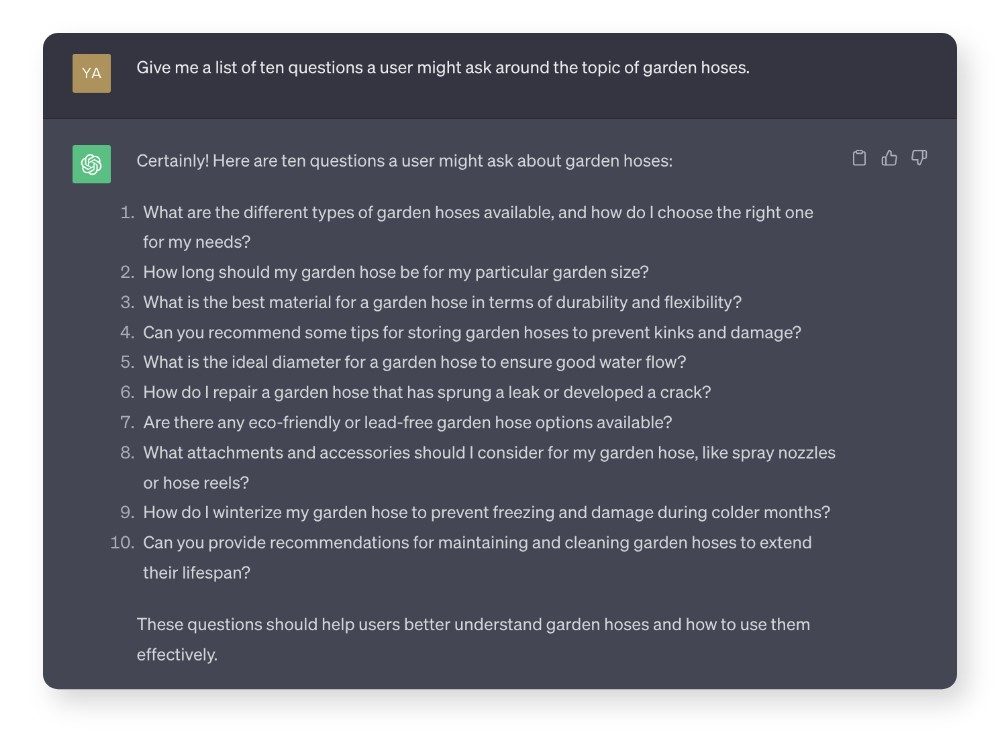
Next, I asked ChatGPT to identify the main themes among those 10 questions. It responded with themes such as materials, length and maintenance — all of which fit into general keyword buckets matching the original list of questions.
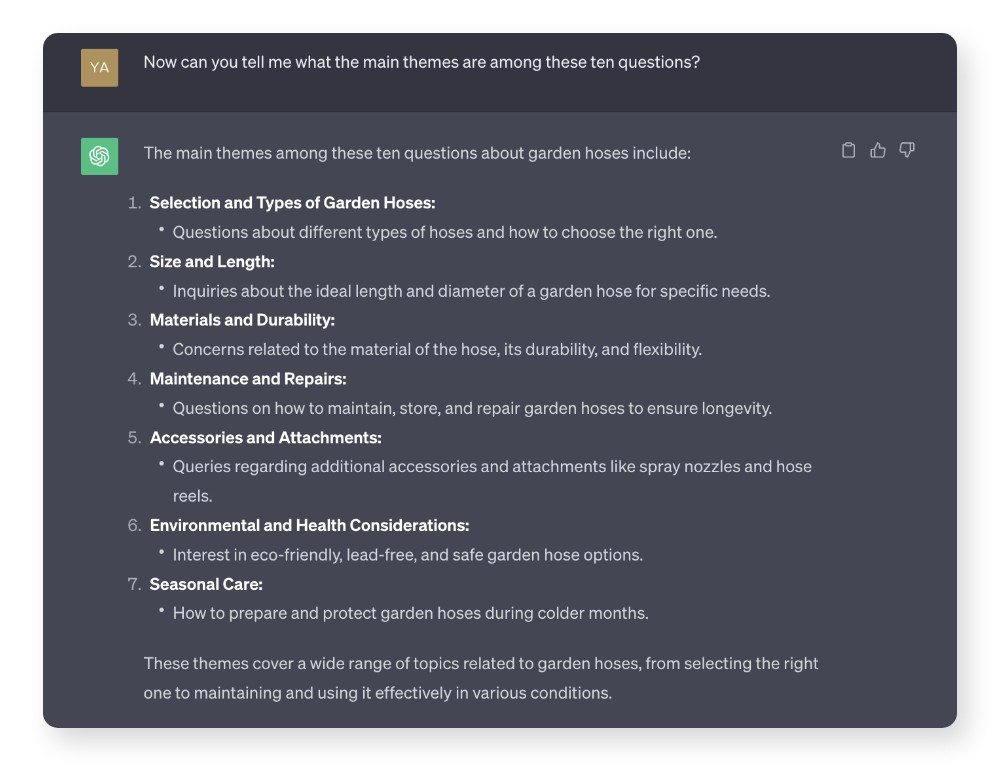
The results gave me a great starting point for the brainstorming process. They also gave me a place to start comparing the main themes from my initial keyword research on garden hoses.
Summary: So far, I’ve found ChatGPT to be extremely helpful when it comes to keyword research. Given a strong prompt, it’s adept at uncovering additional FAQs that users might ask. It’s also able to provide insight into the most important core topics related to an original query.
3. Generative AI can be a time-saver when writing title tags and meta descriptions.
Effective title tags and meta descriptions are short in character length, are descriptive and highlight the most relevant content from a website page to attract users to click. However, writing metadata for multiple landing pages or blog articles is often easier said than done. That’s why using generative AI tools to spit out five different options for a title tag, for example, can provide a great basis for piecing together the perfect title tag and description for a landing page or blog article.
In my experience, the best way to do this is to copy and paste the content from a landing page or blog article and prompt the generative AI tool of choice (in this case, Claude) to “write five short, descriptive and compelling title tags based on the following content.”
Prompting the tool to generate a variety of options for title tags and meta descriptions — using the content our team of professional writers has already developed — is a safe way to avoid common chatbot errors. Because it involves only the content we enter, this approach eliminates any false information or hallucinations.
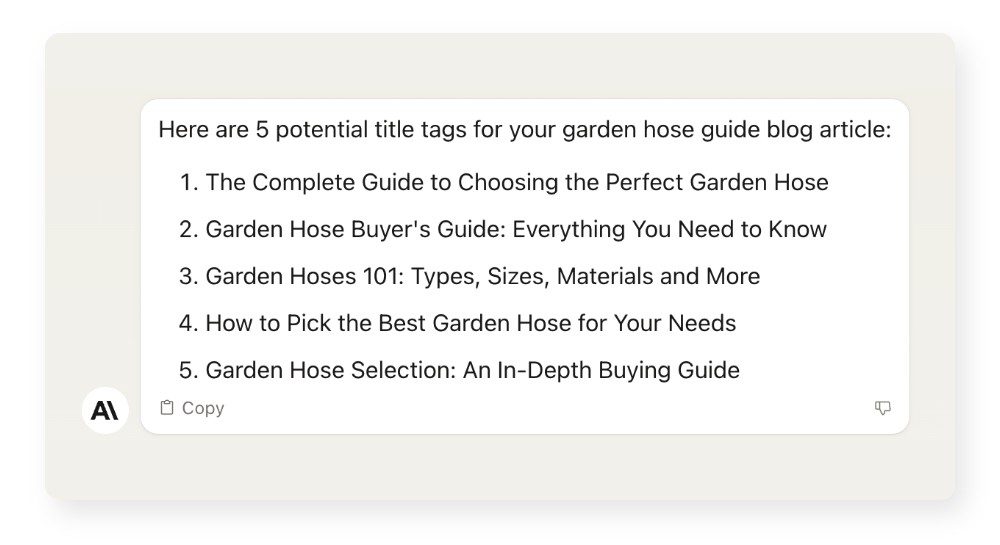
After we’re done crafting the perfect title tag and/or meta description, we can focus on keyword placement, length constraints and overall flow.
I should note that, while AI helped give me some quick starting point options to react to, I likely won’t use any single output as given. Most of the choices Claude provided were great starting points but a little too long and confusing for users. This meant I had to edit them for clarity.
Summary: Strong title tags compel human users to click on content, and although Claude can make the upfront work much quicker, the human element is critical for crafting engaging title tags.
How can AI hurt your SEO strategy?
1. Demonstrating unique, firsthand experience is nearly impossible using AI.
Quality content is huge when it comes to a winning SEO strategy in 2023, and it will likely only become more important with the rise of AI-written content.
This year, Google took a stance on how AI-generated content fits into their approach of providing users with the most helpful content in the search engine results pages. A recent article published by Google Search Central says, “Our focus on the quality of content, rather than how content is produced, is a useful guide that has helped us deliver reliable, high quality results to users for years.”
In other words, Google will continue to reward whatever site they deem as the most relevant and high-quality result for the user’s search, regardless of whether it was written by AI or a human.
Enter E-E-A-T (Experience, Expertise, Authority and Trustworthiness) — Google’s framework for determining whether content demonstrates firsthand experience. Google recently added the extra E for “Experience” as a way to better assess results and answer the following question:
“Does content also demonstrate that it was produced with some degree of experience, such as with actual use of a product, having actually visited a place or communicating what a person experienced?”
E-E-A-T comes down to the fact that some questions can be answered only by humans. Firsthand experiences, emotions and opinions are unique to humans and simply cannot be replicated by AI.
This is not to say that all content requires firsthand experience and expertise. AI can and likely will continue to be used for generating succinct answers within topics that don’t necessarily require expertise, such as basic how-tos and definitions.
What E-E-A-T does show is that the standard for high-quality content and real expertise will only continue to grow.
Summary: Readers crave real expertise and unique perspectives, and Google knows this. The recent addition of "Experience” to its framework for assessing content recognizes unique human aspects, such as firsthand experiences, emotions and opinions, that AI can’t replicate. While AI is suitable for certain topics, the demand for high-quality, expert-driven content will only continue to increase.
2. Google algorithms are designed to pick up on duplicate or low-quality material.
You’ve likely seen it: AI chatbots using generative AI can give you a couple of paragraphs on just about anything in seconds, and it’s amazing! But because just about anyone with Wi-Fi and a device can now ask chatbots a question on the same topic, iterations of the same content are being generated over and over again. And because Google algorithms are designed to pick up on duplicate or low-quality material, your AI-generated content won’t be featured in search results if it’s too similar to other content that exists in the SERPs.
To stand out, you need unique, expert-level knowledge. Additionally, AI-generated content lacks the human element: It may be technically accurate but not necessarily engaging or entertaining. This leads to low engagement metrics or — worse — unsatisfied readers who may never return to your site again.
Summary: The key to long-term SEO success lies in creating outstanding, tailored content that resonates deeply with your target audience. To build an effective, long-term SEO strategy, lean into your human advantage by crafting content with originality and purpose — which AI cannot duplicate.
3. It will become harder for sites to attract links with AI-generated content.
Think about it: Why would a credible website link to a page with generic content? They could easily write that themselves. Backlinks to high-quality sites signal to Google and other search engines that your website’s content is a credible and authoritative source on a topic.
Case studies, expert Q&As and interviews, product reviews, and infographics are all popular types of content for link building that require — you guessed it — expertise. It’s easy to understand why a website that leans heavily on AI for content is not going to be the first choice among credible websites looking to link to another source. We know that AI has its uses and perks, but the art of link building requires creativity and in-depth knowledge of the topics you’re trying to tap into. That’s why it stands out from the competition.
Summary: Build trust and tap into new link-building opportunities by creating content that gives your unique take. Thoughtful perspectives, not AI filler content, will attract links and establish your expertise.
Leverage AI to Complement (Not Replace) Expert Content
To stay ahead of the competition, it’s important to use AI in a way that complements your SEO strategy and leverages its capabilities while still providing high-quality, unique content for your website.
Remember, even the best tools powered by AI technology are just that — tools. And as with hand tools, they won’t do the work on their own. Sure, a chatbot can produce basic definitions and statistics to support even more complex topics. But AI simply can’t match the creativity and experience of a human being. And if you want your brand to stand out from the crowd, you’ll need the high-quality, unique content that only a human can create.
